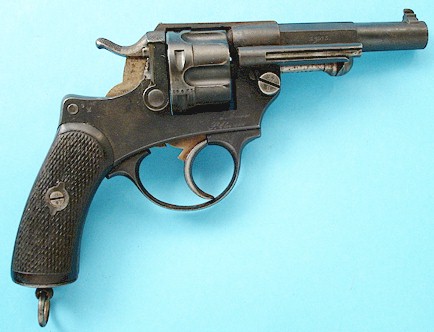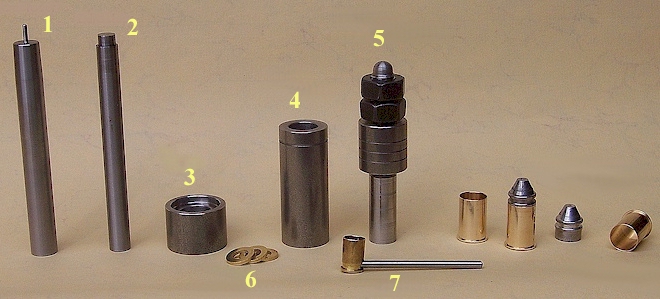|
|
||||
|
French 11mm revolver reloading kit
The kit is composed of the following tools : (1) primer removing rod, (2) extractor rod, (3) basement, (4) crimper block, (5) pushing tool, (6) adjusting washers, (7) powder measuring cup.
You have first to insert a primer cap into the primer pocket of the cartridge. The primer must be of the large pistol type as the Winchester reference shown above.
1 - Insert the primer cap using the ejecting rod of the tool kit like shown above (second picture). Push the cartridge case against the primer on a flat hard surface until it is fully seated as shown in the third picture above. Note that it is one method among others. You can also push the primer inside the case using the same rod with the case positioned up side down. The only important thing is to not strike the primer with a pointed tool.
2 - Fill the case with the necessary black powder. The right level is a reached when there is no gap of air between the powder and the bullet base. Not seating the bullet firmly against the powder column can result in the loose powder burning all at once, which can create a dangerous over pressure condition. Note that any type of black powder (from coarse to very fine) should work, as the French Model 1873 revolver is robust enough to withstand them all. It is just a matter of testing what is the best recoil for you. Black Powder comes in four
granulations. Fg being the coarsest (slowest to burn), and FFFFg being the finest (fastest
to burn). You will find the same grades under the following labels : 1Fg to 4fg or even 1F
to 4F
Pushing tool 3 - Put the case on the basement as shown above, and start the seating of the bullet manually. Be sure that the bullet is perfectly aligned with the case mouth in order to avoid any lack of verticality that would become very difficult to compensate later. Then place the crimper block, and pushing tool, over the cartridge. The external groove of the crimper tool must be below. Let the crimper block assembly slide down until it is stopped by the basement.
4 - Using a mallet, force the bullet into the case until the bullet lower shoulder is in contact with the case upper edge. Turn the upper nut against the lower one to secure the right length of the pushing rod.
5 - The last action is the crimping of the case mouth. Place the washers inside the basement before putting the cartridge case on them. Let the crimper tool go down (with the external groove below), and push it with a mallet (you can also use a vise) until the crimper's face reaches the basement. Just add some wax-grease mixture in the bullet lubricating groove before using it. Bullet lubrication is essential to reduce bore leading.
The bullet shoulder that bears the lubricating groove has a diameter of 11.50 mm. The cartridge base is 10.90 mm large, and is growing to 11.20 mm when reaching the lower edge of the shoulder. By the bullet seating (second picture) the case mouth is forced from 10.90 mm to 11.85 mm. After the crimping, the cartridge case diameter is compressed against the bullet to 11.50 mm.
1 - Remove the primer cap using the appropriate rod. Once the case is de-capped you have just to clean it thoroughly (with an ammoniacal cleaning solution) before using it again.
2 - Lubricate the case before re-calibrating it with the crimper block as shown above. Note the lower position of the external groove.
3 - Drive the re-calibrated case out of the crimper block through the basement using the extractor rod.
|
Flint stones of various size
Available here Pinfire Reloading
|
|||




























